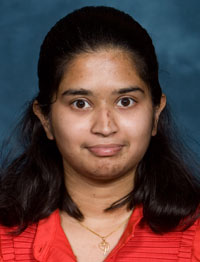
Adaleena Mookerjee, a fourth year PhD candidate in Mechanical Engineering, has won the Acoustical Society of America’s Second Place Best Student Paper Award in Acoustical Oceanography.
Mookerjee was selected to receive the award by the society’s Technical Committee for Acoustical Oceanography—one of thirteen committees that each specialize in a particular aspect or application of acoustics.
The Acoustical Society of America, founded in the late 1920s, is a scientific society comprised of about seven thousand members from across the globe. It seeks to facilitate the exchange of knowledge not only strictly in the field of acoustics, but also in its corollaries such as physics, engineering, oceanography, physiology, psychology, and architecture. The wide range of applications considered by the society gives it a broad appeal that lends diversity and sets the standards in the field as a whole.
Students have the opportunity to present their research papers at either of the society’s two annual meetings. Based upon the presentation of the paper, recipients of Best Paper Awards are chosen.
Mookerjee presented her paper at the society’s spring meeting held in Providence from May 5th-9th. She said that the opportunity gave her both a chance to learn and an intensified drive to pursue her research.
“Everyone is so passionate about the field that you sort of come back with added motivation,” Mookerjee added.
Her research paper titled “Comparison of near-field acoustic coherent backscattering simulations with optics theory and experiments” was completed under the guidance of Professor of Mechanical Engineering David Dowling, who is also cited as an author of the paper.
As an undergraduate at Cornell University, Mookerjee focused on biomechanics. After taking classes in various fields, she chose mechanical engineering, since it was interdisciplinary, and focused on energy and sustainability and biomechanics. To continue her passion in mathematics, she also took several classes in the Mathematics department.
“Acoustics is a little bit of a tangent from mechanical engineering but I’m interested in math, and acoustics is a lot of math,” Mookerjee said.
The paper, published in the Journal of the Acoustical Society of America, connects the coherent backscatter enhancement in acoustics obtained via simulation with the coherent backscatter enhancement. By modifying the coherent backscatter enhancement, schools of fish may be remotely distinguished from other objects. This process applies to environmental awareness, monitoring, and various sonar applications.
Currently, Mookerjee is using a simplified model to simulate a school of fish in her research, but plans to eventually expand upon her findings so that they may be directly applied to a school of fish in an actual ocean environment.
